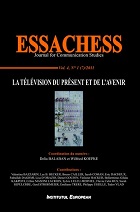La télévision, un instrument démodé ou crucial pour l'avenir de l'Union européenne?
The television, an instrument old-fashioned or critical for the future of the European Union?
Author(s): Violaine HackerSubject(s): Social Sciences
Published by: ESSACHESS
Keywords: common public goods; cultural diversity; global democracy; knowledge economy; local identity; soft power; technologies
Summary/Abstract: In a globalized information society, the institutional machinery - willing to promote media policy in the framework of the “knowledge economy” - may stand only wishful-thinking, if media literacy is not utilized as a boon for citizens facing new forms of Medias. Communication on TV in the public sphere is no longer located in the industrial era, described by J. Habermas with his notion of “discursive democracy”. In a more complex and subject to conflict public space, policy-makers have to integrate and manage contradictions as regards the economic vision of global public goods and the ethical vision of the common good. In a competitive industrial environment, the notion of cultural diversity - seen in Europe as a common good (before the WTO and UNESCO) - is supposed to combine the promotion of European citizenship, to respect local identities and to implement national industries in a global context. The EU tries timidly to fit into globalization as a soft power in order to collude with new cultural players, but remains a fragmented power among nations searching for a direction.
Journal: ESSACHESS - Journal for Communication Studies
- Issue Year: IV/2011
- Issue No: 01
- Page Range: 11-21
- Page Count: 10
- Language: French

